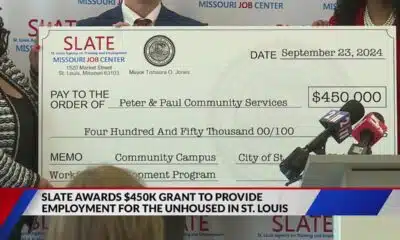Mississippi News
Gunn scales back his income tax elimination proposal
Speaker Philip Gunn scales back his income tax elimination proposal
House Speaker Philip Gunn on Wednesday offered a greatly scaled-back income tax elimination plan — a peace offering amid a tax cut standoff with the Senate that threatened to derail the 2022 legislative session in its final days.
Gunn also said the House would not block spending of federal pandemic stimulus money or setting a state budget for next year. But he made clear that the House could hold up spending more than $2 billion in surplus state money and other measures over the tax debate.
READ MORE: Cities, counties urge lawmakers to approve federal stimulus spending amid tax cut standoff
And he reiterated, as he has since last year, that he wants Mississippi’s personal income tax eliminated — not just cut — even if it takes many years to do so.
“We have sent at least four different proposals or plans to the Senate,” Gunn said. “… We have extra revenue. If we don’t give back to the taxpayers, what then does the Senate propose? Spend it.”
Lt. Gov. Delbert Hosemann in a statement on Wednesday said, “We understand the House is now prepared to allocate the one-time (federal stimulus) funds and we look forward to working with them to finalize a plan.”
But on tax cuts, Hosemann appeared to stand pat on the Senate proposal. He said the Senate has “a conservative plan” that “includes cutting taxes and taking care of core government services—not gutting them.” He said he’s not opposed to someday eliminating the income tax, but that can be addressed over time.
The latest House proposal is to eliminate the state personal income tax — which generates about $1.8 billion, or one-third of state general fund revenue — by $100 million a year until it’s gone. The new proposal has a six-year “repealer,” meaning lawmakers would have to review and reinstate the plan in six years. Besides, Gunn noted, the Legislature could “suspend” the tax cuts at any time if the budget tanks. Elimination would take 18 years under the new proposal.
The $100 million a year cuts in income tax would mean about $100 a year to a Mississippian making about $40,000 a year or $200 for a couple making $80,000.
“This ($100 million a year) would be about 1.5% of our budget, or a penny-and-a-half on the dollar we would be giving back to the taxpayer,” Gunn said. “… We have about $1.5 billion in excess revenue right now, and we’re on pace to have about $2.5 billion … We believe we have enough revenue to give some relief to the taxpayers, and we want to do that before we spend these excess dollars.
“We have addressed every Senate objection,” Gunn said. “… The only remaining objection is, do you spend the money or give it back to the taxpayers?”
Republican Gunn and the House leadership have pushed for personal income tax elimination for two years now, but have been thwarted by Republican Hosemann and his Senate leadership. Hosemann says the current budget surplus is the result of billions of federal dollars being dumped into the state economy and is likely fleeting. He said eliminating a third of the state’s revenue during uncertain economic times is ill advised. Senate leaders have said that there should be plenty of opportunities down the road to cut or eliminate taxes — depending on what the economy does.
Nevertheless, Hosemann and the Senate have proposed what would also be the largest tax cuts in state history, plus a one-time rebate for taxpayers this year ranging from $100 to $1,000 depending on income.
But House leaders have called the Senate tax cuts a half measure, and say that eliminating the personal income tax would draw people and businesses to Mississippi. Hosemann and Senate leaders counter that improving education and infrastructure in the poorest state in the nation would do more to draw people and industry.
Gunn’s House tax elimination proposal has been through numerous iterations since last year. It started as more of a tax swap, phasing out the personal income tax while raising the sales tax on retail and other goods by 2.5 cents-on-the-dollar. It had “growth triggers” that would have eliminated the personal income tax with state revenue growth over years.
Facing opposition from various business interests, Gunn has scaled back, then recently eliminated the sales tax increases. Gunn has also retreated on cuts to car tag fees and reducing the sales tax on groceries, although the Senate still proposes cutting the tax on groceries from 7% to 5%.
The Senate has recently increased its proposed tax cuts amid the debate, but stood firm against eliminating the income tax. Most recently, Hosemann proposed reducing the state’s top, 5% tax bracket to 4.6% over four years, then elimination of the lower 4% tax bracket over the next four years after that. Originally, the Senate had proposed only the phase out of the 4% bracket. The new, eight-year Senate tax cut plan would cost about $439 million a year when totally implemented.
Hosemann and the Senate are also proposing to suspend the state’s 18.4 cents-a-gallon gasoline tax for six months using about $215 million in tax dollars on hand to reimburse the Mississippi Department of Transportation, which uses the gas tax for roads, bridges and matching federal dollars. House leaders said Mississippians would probably barely notice such a break with gas prices currently so high.
Mississippi city and county leaders on Wednesday welcomed Gunn’s commitment that the House would not block spending of federal American Rescue Plan Act money over the tax cut battle.
Mississippi cities and counties are receiving a combined $900 million from ARPA. The state is receiving $1.8 billion, and the Senate and House have offered proposals for the state to match local government infrastructure spending to allow for more meaningful upgrades. Many cities and counties have dilapidated water, sewerage, roads and other infrastructure, and the ARPA funds offer what Hosemann has called a “transformational, generational” opportunity.
READ MORE: Cities, counties urge lawmakers to approve federal stimulus spending amid tax cut standoff
Hosemann had decried Gunn and the House’s threats to hold up ARPA spending over tax elimination. This week, leaders of associations representing 299 cities and 82 counties in Mississippi called on lawmakers to move forward on the spending to allow local governments time and resources to make major infrastructure improvements.
After Gunn’s announcements Wednesday, Shari Veazey, director of the Mississippi Municipal League that represents city governments, called Gunn’s pledge “progress.”
“We are very supportive of them moving ahead with the ARPA funds,” Veazey said. “That sounds like progress. We have cities with shovel-ready projects … But it takes time to engineer and plan a project, bid them out, and then the actual construction. These things can seem to move at a snail’s pace — we have supply chain and other issues now, too — and the sooner they could get started the better.”
Hosemann and others have warned that delaying the ARPA spending could result in losing the money, if the state missed federal deadlines for the spending, or if Congress decided to take back unspent money.
On Wednesday, Hosemann again fired back at Gunn and any threats to hold up other spending or legislation over the tax debate.
“None of us were elected to grind government to a halt,” Hosemann said. “We will not conduct ourselves this way in the Mississippi Senate. We will continue to work and call for public conference committees on the budget and other general bills.”
This article first appeared on Mississippi Today and is republished here under a Creative Commons license.
Mississippi News
Suspect in Charlie Kirk assassination believed to have acted alone, says Utah governor
SUMMARY: Tyler Robinson, 22, was arrested for the targeted assassination of conservative activist Charlie Kirk in Orem, Utah. Authorities said Robinson had expressed opposition to Kirk’s views and indicated responsibility after the shooting. The attack occurred during a Turning Point USA event at Utah Valley University, where Kirk was shot once from a rooftop and later died in hospital. Engravings on bullets and chat messages helped link Robinson to the crime, which was captured on grim video. The killing sparked bipartisan condemnation amid rising political violence. President Trump announced Robinson’s arrest and plans to award Kirk the Presidential Medal of Freedom.
The post Suspect in Charlie Kirk assassination believed to have acted alone, says Utah governor appeared first on www.wjtv.com
Mississippi News
Americans mark the 24th anniversary of the 9/11 attacks with emotional ceremonies
SUMMARY: On the 24th anniversary of the 9/11 attacks, solemn ceremonies were held in New York, at the Pentagon, and in Shanksville to honor nearly 3,000 victims. Families shared personal remembrances, emphasizing ongoing grief and the importance of remembrance. Vice President JD Vance postponed his attendance to visit a recently assassinated activist’s family, adding tension to the day. President Trump spoke at the Pentagon, pledging never to forget and awarding the Presidential Medal of Freedom posthumously. The attacks’ global impact reshaped U.S. policy, leading to wars and extensive health care costs for victims. Efforts continue to finalize legal proceedings against the alleged plot mastermind.
The post Americans mark the 24th anniversary of the 9/11 attacks with emotional ceremonies appeared first on www.wcbi.com
Mississippi News
Hunt for Charlie Kirk assassin continues, high-powered rifle recovered
SUMMARY: Charlie Kirk, conservative influencer and Turning Point USA founder, was fatally shot by a sniper during a speech at Utah Valley University on September 10, 2025. The shooter, believed to be a college-aged individual who fired from a rooftop, escaped after the attack. Authorities recovered a high-powered rifle and are reviewing video footage but have not identified the suspect. The shooting highlighted growing political violence in the U.S. and sparked bipartisan condemnation. Kirk, a Trump ally, was praised by political leaders, including Trump, who called him a “martyr for truth.” The university was closed and security heightened following the incident.
The post Hunt for Charlie Kirk assassin continues, high-powered rifle recovered appeared first on www.wjtv.com
-
News from the South - West Virginia News Feed7 days ago
Protesters in D.C. flood the streets demanding an end to Trump’s military deployment
-
News from the South - Virginia News Feed7 days ago
On the record: Winsome Earle-Sears
-
News from the South - Missouri News Feed6 days ago
1587 Prime gives first look at food, cocktail menu ahead of grand opening in KC
-
News from the South - Arkansas News Feed6 days ago
‘One Pill Can Kill’ program aims to reduce opioid drug overdose
-
Mississippi News Video6 days ago
Interview: Come see Baptist at WTVA Senior Health Fair
-
The Conversation7 days ago
How is paint made?
-
News from the South - Alabama News Feed6 days ago
Alabama lawmaker revives bill to allow chaplains in public schools
-
News from the South - Arkansas News Feed6 days ago
Arkansas’s morning headlines | Sept. 9, 2025
















































